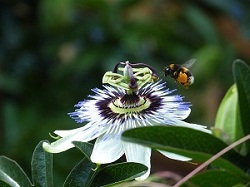Pollinator extinction research published by University academics in prestigious journal Science
Date 16.11.2015

New research to be published today in the prestigious journalScience will challenge ideas about the historical causes of pollinator decline in the UK.
The research is a collaboration between Professor Jeff Ollerton, Dr Robin Crockett and Dr Hilary Erenler from the University of Northampton, and Mr Mike Edwards from the Bees, Wasps & Ants Recording Society (BWARS). The team analysed almost 500,000 records held by BWARS, considered to be the most extensive data set on these insects available for any country.
Since 1850, 23 British species of pollinating bees and wasps have become extinct. By analysing the changing rate of species extinction over time, the study has shown that the main period of species loss followed changes to agricultural policy and practice just after the First World War.
This is much earlier than previously believed: until now it has usually been the Second World War and the subsequent Common Agricultural Policy which have been seen as the main drivers of pollinator loss.
Professor Ollerton, who led the research, commented: “Bees, wasps and other pollinating insects are absolutely vital to the functioning of our natural ecosystems and for a great many agricultural crops. We’ve known for some time that these insects are declining in Britain but now we can see how historical agricultural changes have caused species to become extinct. The big question is whether these extinctions have stopped or whether they will continue in the future. The species that have been lost to Britain still survive on the Continent and there is the possibility of natural re-colonisation or artificial reintroduction, both of which have occurred in recent years. However in order for this to be successful we must restore as much natural habitat as possible within our farmland.”
The study developed a novel statistical method of analysing extinction data. Dr Crockett, who led the modelling, also commented: “This research demonstrates how new knowledge can be created when researchers from different subject areas join forces and it is always rewarding to see techniques developed in one research area finding new applications in another. It also illustrates the importance of maintaining the year-on-year effort of recording this sort of data – the research simply wouldn’t have been possible without the BWARS records, which are mainly collected by amateur natural historians.”
The research paper, entitled “Extinctions of aculeate pollinators in Britain and the role of large-scale agricultural changes” is the first analysis of how these pollinating insects have been lost over time. It comes just weeks after the release of the UK Government’s National Pollinator Strategy which aims to reverse pollinator declines in the country.
—
Picture: Passionflower with Bombus, by Jeff Ollerton.